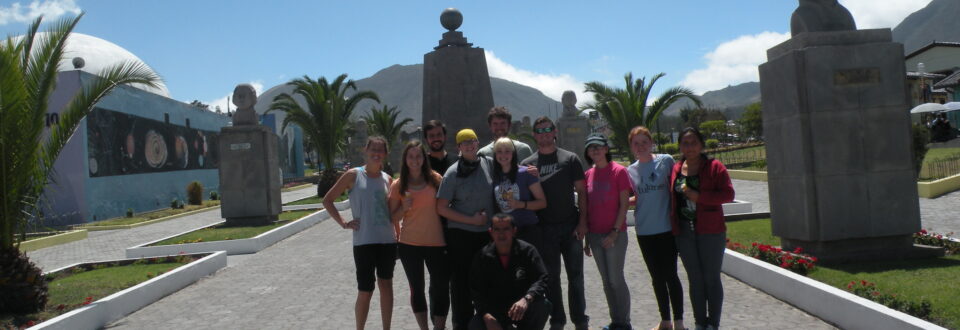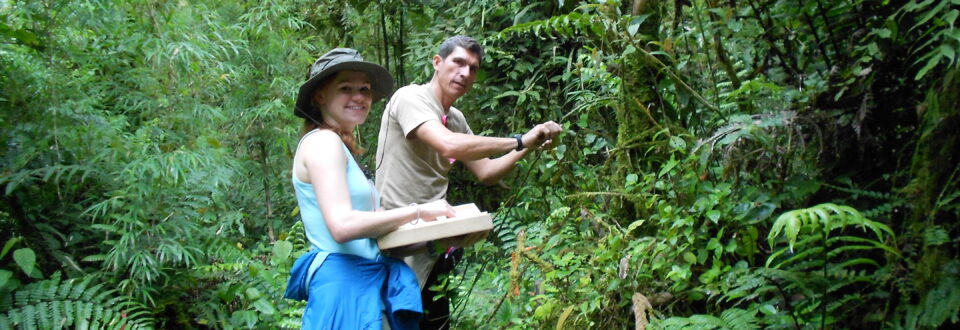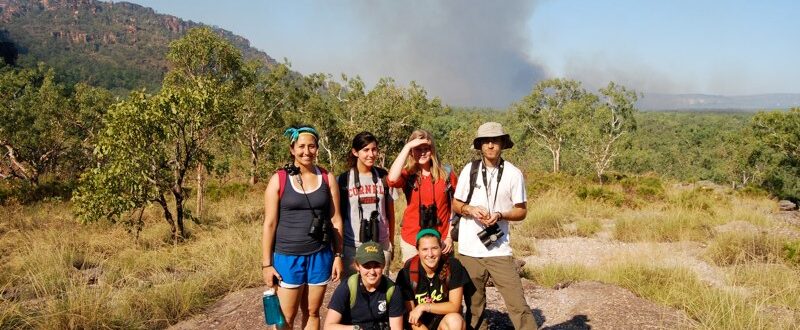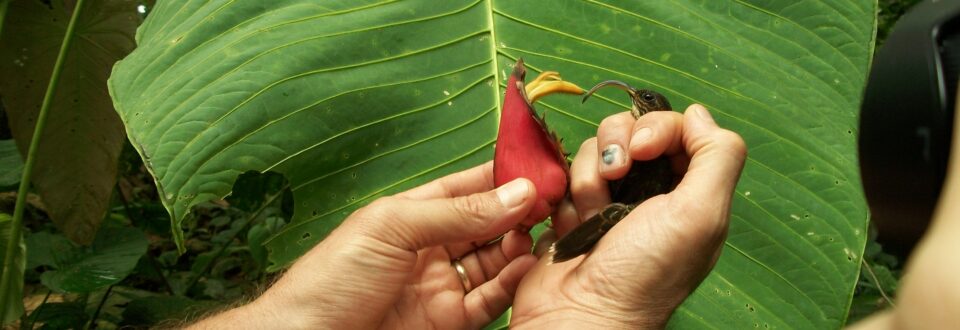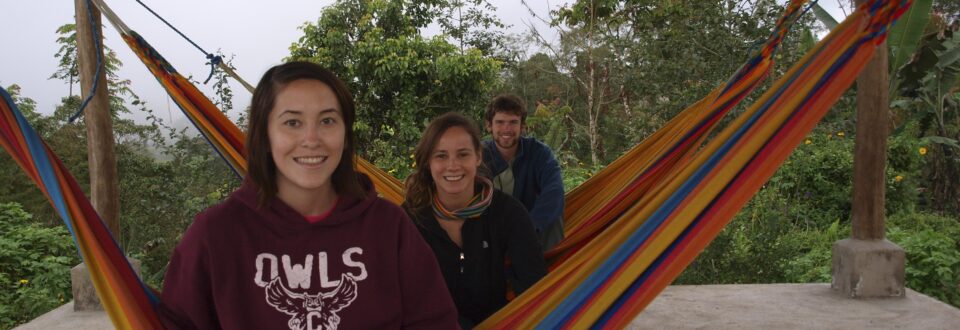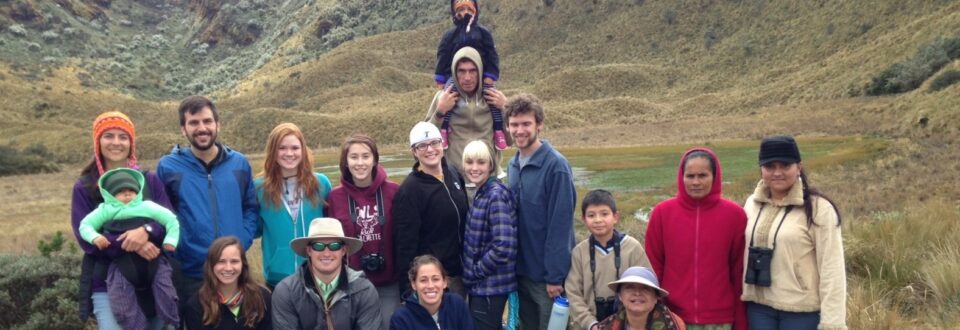Teaching, mentoring, and building research capacity among the next generation of scientists is a core objective of our lab. We tend to emphasize experiential, “hands-on” approaches to learning. This is true both for formal courses taught through Tulane University, as well as for Independent Study projects conducted by students from Tulane and other institutions and volunteers.
Tulane Courses
EBIO 3290: Behavioral Ecology (3 credit hours; optional Service Learning credit). This course addresses the ecological and evolutionary causes and consequences of animal behavior, with a focus on using evolutionary principles and ecological context to understand complex behaviors. Topics include sociality, mating systems, sexual selection, animal movement, signal evolution, conservation, proximate mechanisms of behavior, and cognition. An emphasis is placed on reading, understanding, and critiquing scientific literature and contemporary research. The course also provides an optional service learning component, with the related goals of (1) raising public awareness about the behavioral ecology and conservation of fauna in New Orleans and the Gulf Region, and (2) enhancing student understanding of behavioral ecology via experiential learning opportunities provided by the service learning. To view the course syllabus, click here.
EBIO 3690: Experimental Animal Behavior (3 credit hours; satisfies Intensive Writing requirement; optional Service Learning credit). This course provides students the opportunity to design, implement, and write-up an independent research project related to animal behavior. Research is conducted on live animals at the Audubon Zoo or Audubon Park. The course emphasizes general principles of literature review and synthesis; experimental design; the collection, organization and analysis of data; and written and oral presentation of results. The course consists of 3 hours of laboratory per week (at the park or zoo) and 2 hours of seminar per week (on campus). This course fulfills the Newcomb-Tulane college intensive writing requirement. The course also provides an optional service learning component, with the related goals of (1) assisting curators at Audubon Zoo and/or Audubon Park with management of animal populations; (2), raising public awareness about the behavioral ecology and conservation of fauna in New Orleans and the Gulf Region; and (3) enhancing student understanding of behavioral ecology via experiential learning opportunities provided by the service learning. To view the course syllabus, click here.
EBIO 3780: Tropical Field Biology and Conservation (3 credit hours; optional Service Learning credit). Tropical Field Biology and Conservation gives students the opportunity to increase their understanding and appreciation of tropical biology, and to apply the theory and knowledge they have acquired in the classroom to the real world. Students travel with Dr. Karubian and Dr. Duraes to Ecuador for a two-week intensive field course over the summer. While on the course, students receive regular lectures on tropical biology and conservation and will implement field-based research projects related to the lecture material. Students will increase their knowledge base about tropical ecology and conservation, and will experience first hand the challenges and rewards of conducting field research and implementing conservation activities in tropical environments. These activities will take place within a context of community engagement based on active collaboration and interaction with Ecuadorian local residents in a variety of contexts. To view the course syllabus, click here. To read news stories about the class from Tulane’s New Wave, click here and here.
EBIO 701: Professional Development (3 credit hours). The primary aim of this course is to improve the grant-writing skills of graduate students, with the specific objective of helping students to submit a competitive… nay, a successful!, grant proposal. As such, each student is required to submit a major grant proposal (e.g., NSF Doctoral Dissertation Improvement Grant; NSF Graduate Research Fellowship, EPA STAR proposal) or a series of smaller grant proposals during the course. The focus of the first part of the course will be the preparation and refinement of these proposals, including NSF proposal review panels; peer review; and writing workshops. The three top proposals from the course (as determined by peer review) will be competitively reviewed by faculty and the top award will receive a prize. The second part of the course will focus on professional themes necessary for successful graduate and post-graduate work in the field of Ecology and Evolutionary Biology. To view the course syllabus, click here.
International Research Experience for Students (IRES): Behavioral ecology research training in Australia’s tropical savannah. This multi-semester experience includes: (1) preparation of independent research projects and training in relevant field techniques during the Spring semester; (2) 8 – 10 weeks of field research in Australia during summer; and, (3) at least one semester of laboratory and data analysis upon return from the field. Participants are expected to develop honors thesis / independent study projects based on this research. In addition to behavioral ecology field research on birds, the Australia experience will include: visits to leading Australian scientific research institutions; field trips to notable biotic regions in the area such as Kakadu National Park; cultural enrichment programs concerning contemporary socio-environmental issues in northern Australia; and collaborative research with honors thesis students from Australia. For more information, check out the IRES website.
Independent Study
Students from Tulane and beyond are encouraged to get directly involved in research in our lab. We have mentored 50+ independent research projects by students from over a dozen countries on a broad range of topics. This includes students who have participated on our NSF-funded International Research Experience for Students (IRES) program in northern Australia, and dozens of U.S., Ecuadorian, and international students who have conducted research in our study area in northwest Ecuador. We are always looking for motivated, independent people who want to gain research experience, including studies that cross disciplinary boundaries. Below is a list of independent student projects conducted in the lab to date:
Australia
Ahn, Grace. Cornell University – IRES Australia 2014
Alvarado, Allison. Field Assistant – Australia 1998
Atwater, Ryan (“Rye-Guy”). Field Assistant – Australia 1998
Bartos, Sarah. Field Assistant – Australia 2006
Bass, Art. Field Assistatn – Australia 2006.
Byrd, Allison. Field Assistant – Australia 2006
Cleland, Ryan. College of William & Mary – IRES Australia 2014
Curry, Tess. College of Wiliam & Mary – IRES Australia 2012
Durden, Jake. Cornell University – IRES Australia 2014
Erwin, Carol. Field Assistant – Australia 1999
Grabenstein, Kathryn. Cornell University – IRES Australia 2012, 2013
Gulachenski, Alex. Tulane University – IRES Australia 2012
Hinton, Mitch. Tulane University – IRES Australia 2012
Holmgren, Mandy. Field Assistant – Australia 2006.
Iverson, Erik. Tulane University – IRES Australia 2013
Kim, Sun-Yun (“Moon Unit”). Field Assistant – Australia 1998
McCormack, John. Field Assistant – Australia 1998
Moody, Nicole. Tulane University – IRES Australia 2014
Moore, Nathalie. College of William & Mary – IRES Australia 2014
O’Toole, Kelly. College of Wiliam & Mary – IRES Australia 2012
Pejchar, Liba. Field Assistant – Australia 2006
Phillip, Payton. College of William & Mary – IRES Australia 2013
Predick, Katherine. Field Assistant – Australia 1998
Riley, Kathleen. Tulane University – IRES Australia 2012
Rockwell, Ellen. Field Assistant – Australia 1999
Rodriguez, Bruce. Field Assistant – Australia 1997
Rose, Xander. Tulane University – IRES Australia 2013
Tito, Greg. College of William & Mary – IRES Australia 2013
Zelack, Kathryn. Cornell University – IRES Australia 2013
Ecuador
Alvarez, Hernan. Universidad San Francisco de Quito, Ecuador (Honors Thesis) – Ecuador 2007
Amable, Courtney (“Cam”). Tulane University (Capstone Indpendent Study) – Ecuador 2013
Anton, Cassidy. University of California, Santa Barbara – Ecuador 2012
Armas, Maria Fernanda. Universidad Central, Ecuador (Honors Thesis) – Ecuador 2006
Armas, Veronica. Universidad Central, Ecuador (Honors Thesis) – Ecuador 2006
Ballard, Ann. Washington State University (Honors Thesis) – Ecuador 2009
Bass, Arthur (“Rubber Duck”). Field Assistant – Ecuador 2004
Batterman, Sarah. Oberlin College (Honors Thesis) – Ecuador 2008
Blanchard, Johnny. Tulane University (Honors Thesis) – Ecuador 2012
Carrasco, Luis. Universidad Central Ecuador (Honors Thesis) – Ecuador 2005
Carstensen, Daniel. Arhaus College, Netherlands – Ecuador 2005
Castillo, Fernando. Universidad de Calceta, Ecuador – Ecuador 2012, 2013
Chambers, Malinda. Tulane University (Capstone Indpendent Study) – Ecuador 2013
Cook, Andrew (“Fiddlin'”). University of Florida – Ecuador 2004 – 2006
Davis, Kristin. College of William & Mary – Ecuador 2010
Dreschke, Gilbert. University of Innsbruck (Honors Thesis) – Ecuador 2012
Duque, Jorge. Universiad Central, Ecuador (Honors Thesis) – Ecuador 2009
El Kasabi, Nori. Université des Sciences et Techniques de Nantes, France (Honors Thesis) – Ecuador 2007
Espinoza, Rocio. Universidad Central, Ecuador (Honors Thesis) – Ecuador 2008
Fabarra, Jose. Universidad San Francisco de Quito, Ecuador (Honors Thesis) – Ecuador 2003
Fleitas, Dominique. Tulane University (Capstone Indpendent Study) – Ecuador 2013
Haberer, Dor. Tulane University – Ecuador 2013
Hazlehurst, Jenny. University of California, San Diego – Ecuador 2009, 2010
Hedley, Richard. Guelph University (Honors Thesis) – Ecuador 2007
Holck Hooge, Mikkel (“Great Dane”). Field Assistant – Ecuador 2004
Iverson, Erik. Tulane Univeristy – Ecuador 2013
Jongsma, Gregor. Guelph University (Honors Thesis) – Ecuador 2007
McNeil, Shannon. Field Assistant – Ecuador 2002
McNew, Sabrina. Pomona College (Fulbright Fellowship) – Ecuador 2010
Mena, Patricio. Universidad Central, Ecuador (Honors Thesis) – Ecuador 2007
Monobanda, Rocio. Universidad Central, Ecuador (Honors Thesis) – Ecuador 2004
Muquis, Noemi. Universidad Central, Ecuador (Honors Thesis) – Ecuador 2010
Nieto, Jimena. Universidad Catolica, Ecuador (Honors Thesis) – Ecuador 2006
Pearson, Thomas (“Yorkie”). Field Assistant – Ecuador 2004
Reardon, Neal Mark (“Chunnory”). Field Assistant – Ecuador 2004
Ramos, Rocio. Lab Personnel. University of California, Los Angeles (Remote sensing research) – Ecuador 2014
Rogers, Amy. University of California, Los Angeles (PhD Thesis Research) – Ecuador 2003 – 2009
Roorda, Tessa. Universidade de São Paulo, Brazil (Honors Thesis) – Ecuador 2006
Runge, Frederic. Alber Ludwigs Universität Germany (Honors Thesis) – Ecuador 2010
Ruohmäki, Anu. Olulu University Finland (Master’s Thesis) – Ecuador 2008
Siverbaum,Moura. University of Gottenburg, Sweden (Honors Thesis) – Ecuador 2005
Steele, Stephanie. University of California, Los Angeles (PhD Thesis) – Ecuador 2010 – 2014
Storey, Jenny. University of York, United Kingdom (Master’s Thesis) – Ecuador 2006
Swartz, Zoe. Tulane University (Independent Study) – Ecuador 2013
Tice, Kimberly (“Maverick”). Field Assistant – Ecuador 2004
Tracy, Diane. Field Assistant – Ecuador 2002
Vargas, Jorge. Universidad San Francisco de Quito, Ecuador (Honors Thesis) – Ecuador 2005
Walsh, Rachel. University of California, Berkeley (PhD Thesis) – Ecuador 2010
Wianko, Erin. University of Guelph (Honors Thesis) – Ecuador 2003
Woods, Lauren. University of Wisconson (Honors Thesis) – Ecuador 2008
Yunes, David. Universidad San Francisco de Quito, Ecuador (Honors Thesis) – Ecuador 2003
Local Projects – New Orleans
Albert, Zoe. Tulane University (Independent Study) – Mockingbirds 2014
Franta, Roxanne. Tulane University (Independent Study) – Mockingbirds 2014
Frumkin, Nathan. Tulane University (Honors Thesis) – Mockingbirds 2013, 2014
Frumkin, Nathan. Tulane University (Independent Study) – Flamingos 2013
Hegedus, Miles. Tulane University (Independent Study) – Flamingos 2013
Hegedus, Miles. Tulane University (Independent Study) – Mockingbirds 2013, 2014
Larson, Erika. Tulane University (Independent Study) – Lab 2012
Lovell, Rachel. Tulane University (Independent Study) – Lab 2012
Peterson, Mandy. Tulane University (Independent Study) – Mockingbirds 2013, 2014

